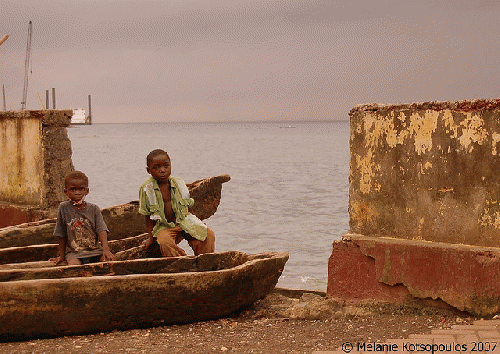According to a recently published United Nations Conference on Trade and Development (UNCTAD) report, the world's poorest countries are trapped in a vicious circle that condemns them to cyclic poverty. In spite of strong export-driven growth and rising aid flows, structural reforms are not put in place and the newly generated wealth does not trickle down to the poorer strata, a phenomenon labeled by the UNCTAD as the "Least Developed Countries (LDC) paradox".
Statistics show that between 2002 and 2008, LDC growth surpassed the expected 7% target, and plowed on even in the eye of the economic crisis. Indeed, during the global slowdown , LDCs grew faster than any other countries, at an average rate of 5.7% per year. On the other hand, the report, which also monitors compliance with the seven Millennium Development Goals to reduce world poverty, goes to show that only one out of the 47 LDCs in the world, Laos, is on track to graduate to the upper echelon of developing countries (DCs). Moreover, only four LDCs are expected to meet a "majority" of the MDGs.
Looking at these disappointing forecasts, the report outlines several policy recommendations for stakeholders and aid donors in order to better direct their efforts towards alleviating world poverty. Donors are called upon to mobilize more resources for investment, to aim for structural projects that would transform the economic backbone of a country, to establish macroeconomic policies that promote "investment and demand growth".
As I am a long-standing observer and active participant in Africa's economic development, the report captured my attention. I have been involved in a fair share of projects across the continent in both advisory and executive capacities, and this on-the-ground experience enables me to draw a few conclusions.
Leafing through the 200-page report, over-brimming with facts, figures and fuzzy words such as "empowerment", one striking element was completely overlooked -- politics. For example, the words "corruption" and "democracy" do not appear even once in the report. Granted, the UNCTAD was looking into policies and macroeconomic conditions, but in my experience with LDCs, the political factor is by far the most important in achieving the desired impact. Any policy recommendation that omits this element in its equation is bound to achieve half-hearted results.
Among the LDCs I've worked in, Djibouti probably offers the most compelling example of the consequences of neglecting the political factors when deciding whether or not to invest capital in a country. Djibouti's main asset is its auspicious geographic location on the banks of the Gulf of Aden by the main shipping lanes going from the Red Sea to the Suez Canal. Thanks to substantial investments in its ports from Dubai and the hundreds of millions of dollars it receives for hosting Western military bases, its economy has clocked an average growth rate of 4.7% over the past decade, while the GDP expanded from $700 million in 2005 to $1.5 billion in 2013. The country is building six new ports, including a LNG and crude-oil terminal, in a bid to attract even more traffic to its shores. What's more, the Chinese have also taken an interest, with Beijing becoming Djibouti's main trading partner and latest actor seeking to gain strategic influence over the Red Sea, using the country as its springboard.
On paper, Djibouti is on the right track -- attracting diverse foreign investment, capitalizing on its specific economic strengths and directing these resources in order to strategically achieve demand growth. But is that enough? A cursory look over social and business stats exposes a completely different story.
A former French colony, the country has been ruled in a manner similar to North Korea -- the same family and party has provided its only two presidents. In spite of strong economic growth, 74% of Djiboutians live on less than $3 a day and almost half the country's population lives in a slum on the outskirts of the capital that lacks minimum sanitation facilities. Food security, adequate nutrition and access to safe drinking water are not ensured for about 70% of the population. Even for African standards, Djibouti has one of the highest infant and mortality rates on the continent. The country ranked 170th out of 187 countries in the UNDP's Human Development Index for 2013, a drop of three spots since 2008, which places it beneath Sub-Saharan Africa's general average. In business terms, according to the World Bank's ease of doing business index, the country ranks 155 in the world, which could serve to explain an unemployment rate of over 50%.
A great part of the blame can be placed on Djibouti's political class. The incumbent president, Ismail Guelleh, rose to power in 1999 after his uncle's demise and quickly began displaying authoritarian tendencies. For starters, he scrapped constitutional safeguards on multiple terms, allowing him to win his 3rd term. The population reacted with anger in a march that saw almost 10% of the population's capital marching down the streets, Guelleh sent the armed forces in, arrested hundreds of protesters and tear-gassed the crowd. The latest U.S. State Department Human Rights Report on Djibouti gives an even more dismal account:
"The most serious human rights problem was the government's abridgment of the right of citizens to change or significantly influence their government. The government did so by harassing, abusing, and detaining government critics; denying the population access to independent sources of information; and restricting freedom of speech and assembly."However, even if there is wide domestic dissatisfaction with Guelleh, rightly perceived as a venal leader who has handed out business contracts to his inner circle with no regard for the fate of the population, the structural changes needed to pull Djibouti out of this cycle of systemic poverty are unlikely to come to fruition in the near future. Maybe the LDC paradox outlined by the UNCTAD has more to do with political environment and the possibility of change, and less with macroeconomic conditions.






